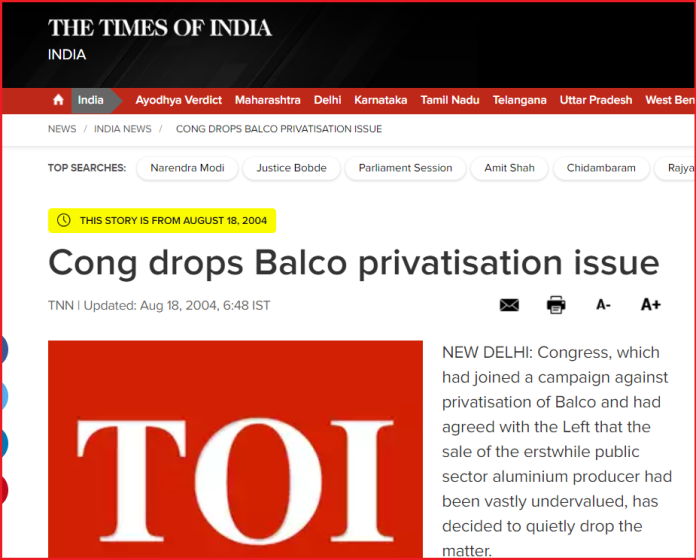Yesterday, the government announced the big bang disinvestment of BPCL and 4 other Public Sector Units. After the corporate tax cuts, this may easily be treated as one of the biggest reform pushes of Narendra Modi.

The Economic Times report calls the move a ‘blockbuster.’ Smiles all around. Businesses, media, people, everyone is happy.
This really takes me down memory lane. How much India has changed and how much better.
Go back to 2001 when the Vajpayee government decided to sell BALCO to Sterlite Industries. It seemed at the time that the world was coming to an end.

Parliament went into an uproar. Workers went on over 2 months of the strike.
The family gold is being given away, they said, invoking the emotional imagery of a woman taking her gold to the pawnbroker, a scene that had played out in one hackneyed Hindi movie after another.
Back then, the only wealthy people ever had was ancestral/family wealth. It was either land or gold. People earned practically nothing in the course of their lifetimes. When they did have some money, they buried it away in a super safe fixed deposit, fearful of hard times. The future was a lurking monster of uncertainty, always to be feared.
It was against this background that Vajpayee went ahead with the most ambitious reform program India had ever seen. Decades of Nehruvian quasi-Communist economics had sowed socialism deep into the political DNA of India. When Vajpayee’s ministers said that it was “not the business of the government to be in business,” it sounded absurd, almost paradoxical to most people. For they had all grown up aspiring to a government job.
Twenty years later, we can only look back and appreciate what it took for the reformist NDA government to bring India out of its socialist stupor. It was a leap of faith that required immense political courage. As history showed, it also ended up being a political sacrifice.
But what is undeniable is the legacy that Vajpayee left for the nation.
In 2003, the Vajpayee government approved a public-private partnership proposal for Delhi and Mumbai airports. When Indians today take pride at these gleaming airports and double-digit growth in airline passenger numbers, remember who made it all possible.
And who paid the price.
Today, we have the government and opposition actively fighting over who can grow the GDP faster. When you take a longer view of Indian politics, it seems almost unreal. It seems like yesterday when the opposition Congress was taunting the Vajpayee government, asking whether 8% growth does any good for the common man.
Indeed, that was the Congress slogan from 2004. The share market is rising, but what did the common man get? At the time, Congress spread the impression that GDP growth and business are anti-poor!
In 2004, it was the socialist quicksand calling us back, appealing to fear and insecurities of a population that had deliberately been kept impoverished by Nehruvian policies. And the saddest thing is that it worked. The UPA government coasted on the strength of Vajpayee’s reform push in the build-up to the 2008 crisis. And for good measure, used these boom times to hand out humongous loans from public sector banks like candy.
After 2008, it was all downhill. The only remnants of the UPA today are the ghosts of those bad loans. Yeah, that’s the only legacy that Sonia Gandhi’s UPA left behind.
Today’s India no longer fears the future but looks forward to it. Today’s India venerates personal merit and scorns at family privilege. As Modi sarkar privatizes BPCL, the imagery of a woman selling her family gold will no longer work for the opposition. Even Hindi movies no longer use that image. Nobody relates to it any more.
Look who quickly dropped BALCO privatization issue after coming to power in 2004 … because they would now benefit from the prosperity generated by economic reforms.

This is how India was fooled, cheated and misled in 2004. How Congress opposed Vajpayee’s reforms, then took credit for the fruits.
India has changed a lot. Privatization is no longer a dirty word. GDP growth is no longer a dirty word. But we can never forgive those who tried to hold India back from her future.
Atalji will always be in our hearts. He will live on in our prosperous future.



